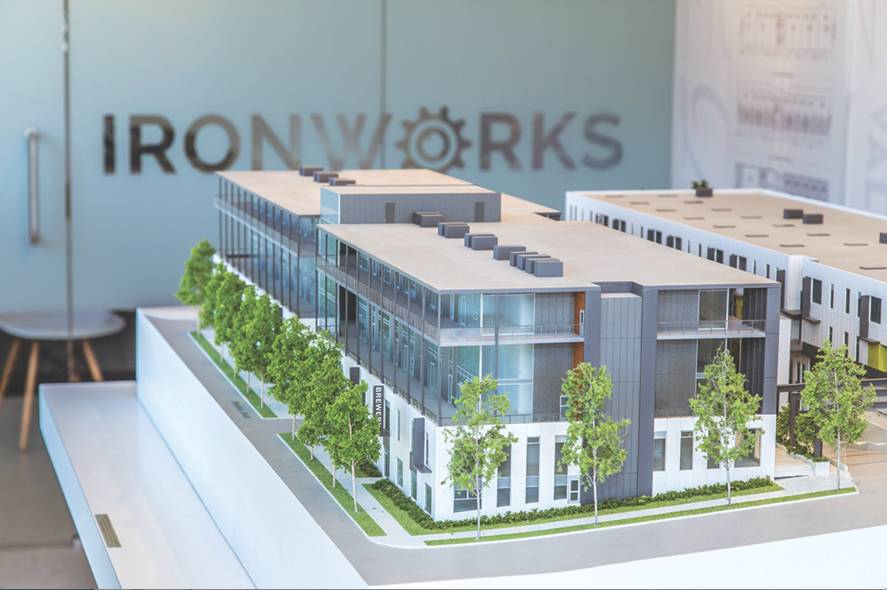Movie and TV producers have seized 28.9 per cent of all the industrial space leased in Metro Vancouver in the past year, often outbidding traditional tenants to becoming the dominant player in a tight market.
One of the biggest industrial deals of 2016 in Alberta involved Aurora Cannabis Inc. building a marijuana grow-op the size of nine football fields at Edmonton International Airport in Leduc.
And, in Vancouver, Calgary and Saskatoon, industrial users are as likely to be a video game maker or architectural design studio, as the entire definition of industrial users adopts a lighter and broader definition.
As well, an increasing amount of new industrial is not being leased but sold to owner-occupiers and investors.
Suddenly, industrial is sexy.
Lights, camera, action
The unprecedented demand from the billion-dollar B.C. film industry, which has leased 1.5 million square feet in Metro Vancouver since mid-2015, has helped to drive the Metro industrial vacancy rate to a Canada-low of 1.5 per cent, according to Sean Bagan, an industrial specialist with Colliers International in Vancouver.
“They have completely changed our industry,” Bagan said, due to film producers’ demand for short leases and a willingness to pay above-market rates, which “had previously never happened.”
Industrial tenants traditionally sign three-, five- or 10-year lease agreements, but film shoots only need studio space for about six months, Bagan explained. As a result, TV and film companies are paying full lease rates, and up to $1 per square foot above that, and even signing two-year agreements to secure the space.
The film producers are scrambling for high ceiling heights in no-column open warehouses of at least 40,000 square feet with enough bay space to turn big trucks, exactly the type of modern buildings sought by the next biggest industrial tenants: retail/wholesale distributors and logistics/transport companies.
But Bagan doubts industrial developers, even those known for speculative plays, would purpose-build for the film industry. Landlords would not want to deal with continual rollovers and there is skepticism that the B.C. film industry will remain as active, even by next year, Bagan noted.
Pot luck
There is a similar caution with marijuana growers, despite a federal government pledge to make pot legal by July 1, 2018, and the industrial demand potential.
The 800,000-square-foot Aurora Sky production plant – capable of growing 100,000 kilograms of cannabis annually at full capacity – is being built on 30 acres leased from the Edmonton Regional Airports Authority in Leduc, an industrial zone that has seen a fifth of its industrial real estate space go dark since oil prices fell 60 per cent in 2014. Aurora, a licensed producer of medical cannabis, already operates a 55,200-square-foot production plant in Alberta’s Mountain View County.
Legalization could create a $10 billion industry in Canada, according to a CIBC World Markets study. As shown in Leduc, a big winner could be the industrial real estate sector, according to a CBRE survey of what happened in Colorado, which legalized pot in 2014.
Marijuana producers have accounted for 35.8 per cent of all the industrial space leased in Denver since 2009 and the marijuana industry is credited with driving Denver’s industrial vacancy rate down from 6 per cent in 2009 to
0.3 per cent in 2015.
“Marijuana industry buyers paid up to four times the market value for retrofitted warehouse space to avoid delays in harvesting,” the 2015 CBRE report noted.
But Terry Thies, an industrial specialist with Avison Young in Vancouver said owners of obsolete industrial property are unlikely to wait for marijuana legalization. “They are more likely to tear an old building down and redevelop it is as strata [for sale] industrial,” he said.
Yuppie Industrial
The sale of industrial space, often referred to as “yuppie industrial” is indeed attracting both developers and investors who sell or buy and lease the property to low-impact occupiers, often from the high-tech industry.
When Conwest Group broke ground on the 200,000-square foot mixed-use Ironworks project, half of the 48,000-square-feet of industrial space had already sold at from $330 per square foot.
The site, just north of East Hastings Street, falls under a 2009 spot zoning initiative of the City of Vancouver that bonuses higher density for job-generating projects in East Vancouver.
PC Urban, which is developing light industrial buildings in Vancouver and Calgary, presold 167,000 square feet of new industrial strata space before they even started construction on its Marine Drive site in Vancouver.
Wall Financial is building Vancouver’s first mixed-use industrial and residential complex, Strathcona Village, on East Hastings Street, which includes 54,000 square feet of light industrial and 283 residential condos. All the residential condos pre-sold before the project even broke ground. The industrial strata space is priced from $450 to $700 per square foot.
Investors are taking note.
“When you can sell four concrete walls and a totally empty space for $500-$700 per square foot, it can make residential condos appear much more complicated,” noted real estate consultant Ozzie Jurock in a recent Insider newsletter.
Next: Investing in retail real estate
Previous: How to invest in industrial real estate



